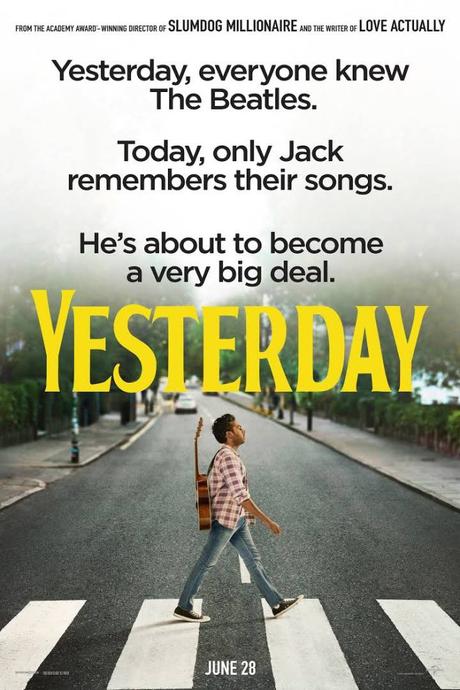
Jack Malik wakes up, and he doesn’t realize it yet, but the Beatles never existed as a band and never changed the world with their music. If you’ve not seen the movie Yesterday … I’m going to spoil part of the plot for you below. If I were you…I’d watch the movie before reading this.
Still here?
Ok.
I was really struck by the undercurrents in this movie. Part of the genius is … they don’t state it explicitly till later on, you just see it developing on Jack’s face as he decides to bring Beatles music he recalls, to a world that has never heard it. Jack spends much of the movie with an expression of panic on his face. He’s viewed as a musical genius, able to cook up a world changing song in 10 minutes. Of course, he’s doing nothing of the sort. He’s just remembering music composed by Lennon, McCartney and Harrison many years ago and reproducing it. No-one else knows that.
Or – almost no-one knows that.
Suddenly we discover that two other people in the world – like Jack – remember who the Beatles were!. Jacks NOT alone in his memory of them after all. And these people watch as Jack is propelled to super stardom. The inevitable consequences look. And finally – these individuals confront Jack – and tell him that they know what he is doing. That he’s not the original composer. Jack’s face says it all – “I’m a fraud, I’ve been found out, I’m finished.”
But what happens next is truly special. They basically say to him, “Jack. Thank you. We aren’t musicians. We can’t sing. But we love those old songs. The world is a better place with these songs in it. And you are making this happen. Your secret is safe with us, and we are just thankful that you have the courage to do this.”
Rather than judgment – Jack receives appreciation and thanks.
Here’s what hits me about this. Before the conversation with these people, Jack faced a moral crisis. Should I come clean and tell the truth? That I didn’t write these songs? After his conversation with his new friends, he realises what service he is providing to the world, and to those folks who know who the Beatles were. He has every reason to feel justified in keeping quiet about the source of these songs and carrying on regardless.
But he can’t.
Even though he has every reason to carry on his present course…and be the star, he decides not to. Not because he can’t face stardom (tho it has its downsides). Its also because – he realises he has to tell the truth. He cannot lie about what he is doing any more.
C S Lewis said, when someone makes a moral judgment (like Jack saying to himself ‘I ought to tell the truth’), “they think they are saying something … true, about the nature of the proposed action … not merely about their own feelings.”[1] There is something objectively real about the urge pressing on us to act truthfully. And when we act untruthfully, we find ourselves justifying our behavior to ourselves…as Jack does. But if we don’t believe that decent behavior is objectively right and we ought to follow this Moral Law, “why should we be so anxious to make excuses for not having behaved decently?”[2]
If there is no one who we are ultimately responsible to, why are we built with this moral core, this need to behave morally? Social programming and evolutionary development of society only gets you so far. We don’t feel beholden to abstract principles. No … we are guilty before a person. Jack is caught in the headlights like a frightened rabbit. Why? What is that about?
“Surely this ought to arouse our suspicions?”[3] Matter and objects cannot make us guilty, it takes a person to achieve that. A young child drawing on the kitchen wall will not receive punishment from the kitchen table. But when his mother sees what’s he’s done, then he’d better watch out!
Surely … our moral obligation points to One who we are ultimately accountable to … a person before whom we are ultimately guilty. A God who is willing and able to communicate, and very interested in right conduct and fair play.[4] It’s before his gaze that I am ultimately guilty.
And yet … however real my guilt, a surprise awaits for anyone who faces him. Like’s Jack’s experience in the movie, the outcome is not what we expect. We don’t need to receive judgment. Instead, we can receive acceptance, love and affirmation in spite of it all.
[1] C S Lewis, Miracles A Preliminary Study, (New York: Macmillan Publishing Co., Inc, 1977), 36.
[2] C S Lewis, Mere Christianity, (London: William Collins, 2009), 8.
[3] Lewis, Mere, 23.
[4] Lewis, Mere, 30.
